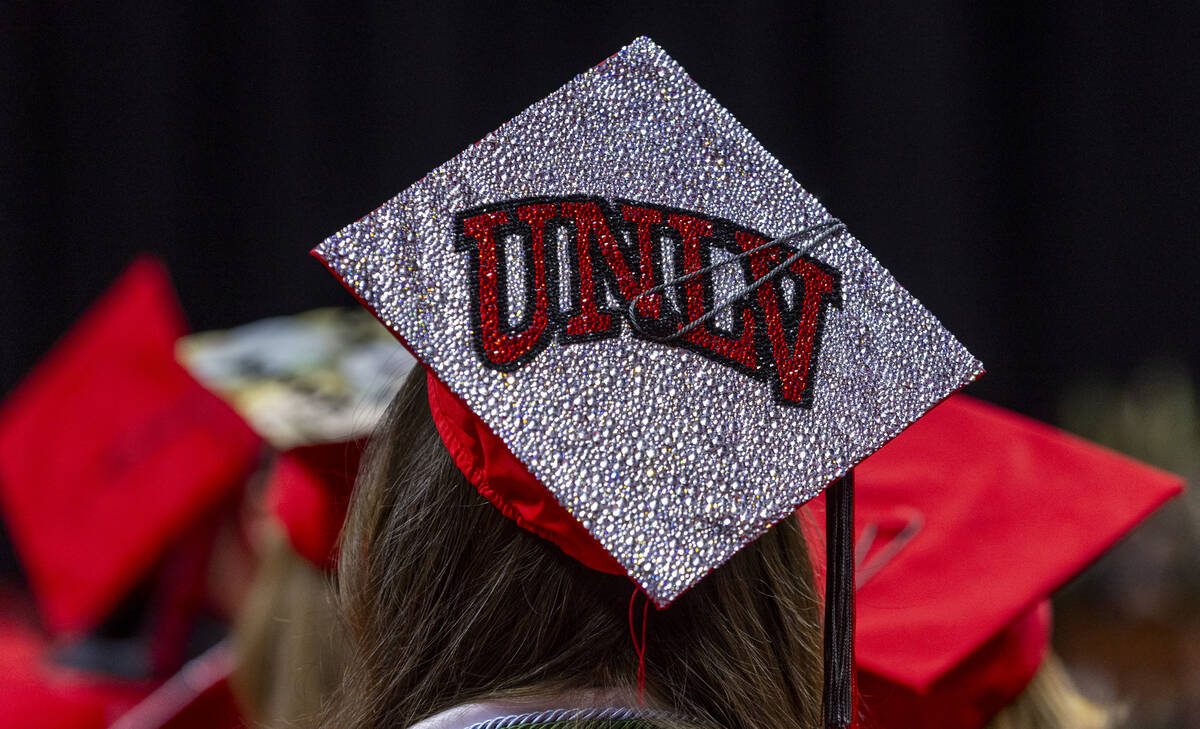UNLV: Student changed approved commencement address to ‘genocide’ speech

A graduating UNLV student whose commencement address characterized the Israel-Hamas conflict as “genocide” against Palestinians gave a different speech than the one she had submitted for review before the ceremony, the university said Monday.
Yvette Machado-Tuinier’s 10-minute speech at the May 11 morning commencement at the Thomas & Mack Center has drawn ire from some who said the speech contained antisemitic elements and misrepresented Israel’s military response in Gaza, and praise from others, as evidenced by the many in attendance who cheered loudly during parts of it.
For its part, UNLV sought to distance the university from the speech.
“A student speaker at UNLV’s morning commencement on Saturday, May 11, changed their speech that was originally submitted in preparation for the ceremony,” said a statement issued Monday by the university’s media relations department. “UNLV understands the words spoken were hurtful to some graduates and others in attendance and do not represent the views of the university.”
Machado-Tuinier, who graduated with a degree in psychology, defended her speech in an emailed statement to the Review-Journal.
“The only comment I have on the speech is that those who may misrepresent the context of my speech in negative ways may have an ulterior motive to linguistically manipulate my message as a means to self justifying their hate, or settle their cognitive dissonance associated with the ongoing oppression and genocide of the Palestinian, Sudanese, and Congolese people,” the email stated.
“My speech was centered on love of people and reverence for the resilience of the oppressed,” wrote Machado-Tuinier, who described herself in the speech as an Indigenous Latina and first-generation college student.
‘This is how our generation responds’
Machado-Tuinier’s speech largely focused on a theme of how oppressed peoples throughout history have worked to overcome that oppression, and how their example should inform the actions of her generation as they embark on the rest of their lives.
“Or even if we had been born today, but in parts of the world where the sins of our history repeat themselves through enslavement, ethnic cleansing and genocide, if we faced the realities of the Congolese, Sudanese, and Palestinians, would we have the courage to resist our oppression?” Machado-Tuinier asked, eliciting cheers at the word “genocide” and even louder cheers when she said “Palestinians,” a video recording of her speech shows.
She also lauded protesters at colleges across the United States, whom she said were being “bullied by media, legislators, and even their own universities simply for opposing war crimes and having the audacity to engage in their First Amendment rights” when they demand that U.S. tax dollars not be used to arm an “occupying state” and also demand the “disclosure of their university’s investments, and divestment from apartheid, and weapons, and funding of an ongoing genocide.”
“This is how our generation responds,” Machado-Tuinier told the audience. “The way we confront the parallels of being a college student in the United States during the same moment in history that our government contributes to the violent erasure and targeted demolition of everything in Palestine, including every university, will serve as our generation’s moral litmus test.”
The terrorist group Hamas, which controls Gaza, invaded Israel on Oct. 7, brutally killing some 1,200 people, mostly civilians, and taking more than 240 people hostage. Israel responded by declaring war on Hamas and vowing to destroy the Iranian proxy. The nearly eight months of war has destroyed much of Gaza and left some 30,000 people dead, according to the Hamas-run Gaza Health Ministry.
‘How did the school let this happen?’
Karin Saham, 24, who is working toward obtaining a master’s degree in hotel administration at UNLV, said the speech made her feel “extremely uncomfortable.”
Saham, who is Jewish and who works for the Israeli American Council, a pro-Israel advocacy group, was at the commencement ceremony to support a friend who was graduating.
“We became very uncomfortable,” said Saham, who said she felt the use of the term “genocide” in that context is antisemitic. “I know everyone reacts in different ways. I know some people were pissed off about it. I personally was upset about it.”
Saham said the speech ruined the ceremony for her, that the speech should’ve focused on congratulating the graduates, and that UNLV should be accountable for the speech. She described the loud cheers as a “scary situation.”
“Our minds immediately went to: How did the school let this happen?” Saham said.
The speech, which was posted on YouTube under the title “Yvette Machado Hate Speech” by a YouTube user named only @YvetteMachadoHateSpeech, has also resulted in the creation of a website, www.yvettemachado.com, that is “dedicated to exposing the harmful views of Yvette Machado.” There is no indication on the website of who was behind it.
‘No other comments on the matter’
In her emailed statement, Machado-Tuinier said that in the wake of some of the response to the speech, she wouldn’t comment further on Monday.
“Due to the heavy biases in the media, and misrepresentation of my character, racism, doxxing, and slander I am receiving from threatening folks, I have no other comments on the matter,” she wrote.
Asked whether Machado-Tuinier would face any consequences for deviating from her submitted speech, UNLV spokesperson Francis McCabe said in an email that “UNLV cannot discuss specific student matters due to federal and state privacy laws.”
Asked whether Machado-Tuinier was a valedictorian, McCabe said UNLV has student speakers at different commencement ceremonies, not valedictorians.
UNLV President Keith E. Whitfield was unavailable for an interview Monday, McCabe said.
Contact Brett Clarkson at bclarkson@reviewjournal.com.